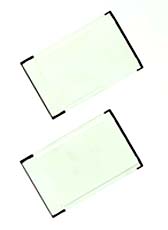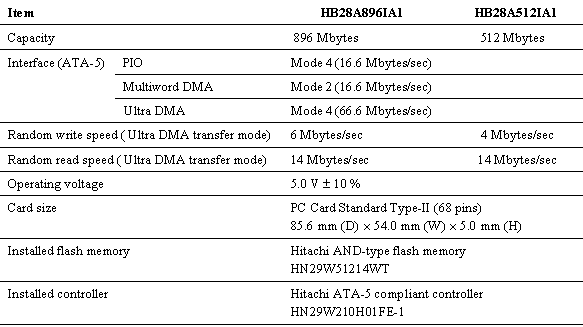 |
The flash card with Ultra DMA transfer mode
“HB28A896IA1” “HB28A512IA1”
|
Tokyo, March 14, 2002—Hitachi, Ltd. (TSE:
6501) today announced the industry's fastest flash card with Ultra
DMA transfer mode*1, offering ATA-5*2
compatibility for the first time in the industry, for silicon disk
use in industrial applications and cache disk use in communication/image
systems. Two models, the 896-Mbyte HB28A896IA1 and the 512-Mbyte HB28A512IA1,
are being released at this time, with sample shipments beginning in
April 2002 in Japan.
This is a new flash card employing high speed interface
for applications requiring high speed and high reliability. Through
the use of an Ultra DMA transfer mode, the 896-Mbyte model achieves
the industry's fastest random write speed of 6 Mbytes/sec (Max.) and
random sector read speed of 14 Mbytes/sec (Max.).
The card size is 85.6 mm (D)  54.0 mm (W)
54.0 mm (W)  5.0 mm (H), conforming
to PC Card Standard*3 Type-II, allowing compact
systems to be created. 5.0 mm (H), conforming
to PC Card Standard*3 Type-II, allowing compact
systems to be created.
[Background]
In industrial fields that have previously used small-capacity HDDs,
there is a growing trend away from HDDs to silicon disks comprising
flash memory and a controller, because of their small size, low power
consumption, and excellent vibration tolerance, as well as the small
system maintenance load they entail . As well as high reliability,
silicon disks offer an extremely short interval between command input
and data reading since there is no head seek time as incurred in HDDs,
and for this reason they are beginning to be employed as cache disks
for system cache use in communication applications such as routers.
Hitachi currently provides for such applications with ATA-1 compliant
CompactFlashTM*4 and PC-ATA
cards, but there is a demand for higher speeds. At the same time there
is a need for high-performance flash cards offering greater space-saving
for use in small, high-performance computer systems.
To meet these needs, Hitachi has developed a high-speed
flash card featuring the same PC Card Standard Type-II package size
as a PC-ATA card and employing an Ultra DMA transfer mode.
[About this Product]
The flash card with Ultra DMA transfer mode achieves high speed through
the incorporation of a Hitachi HN29W210H01FE-1 ATA-5 compliant flash
memory controller. The 896-Mbyte HB28A896IA1 and 512-Mbyte HB28A512IA1
incorporate, respectively, 14 and eight Hitachi HN29W51214WT (512-Mbit)
AND-type flash memory chips that offer excellent data storage characteristics.
Major features of this card are summarized below.
| (1) |
Industry's Highest Speed
Using an Ultra DMA transfer mode, the 896-Mbyte model achieves
the industry's fastest flash card random write speed of 6 Mbytes/sec
(Max.) and random sector read speed of 14 Mbytes/sec (Max.). Random
writes are approximately 3 times faster, and random reads approximately
7 times faster, than with Hiatchi's HB28B512C6 512-Mbyte CompactFlash
product, enabling faster image systems and network systems to
be implemented. |
| (2) |
ATA-5 Compliance in a Small Package
Compliance with the ATA-5 and ATA-4 standards means that interface
and software changes are unnecessary when converting a system
using a conventional HDD to flash disk use. In addition, the use
of a 64-pin package compliant with PC Card Standard Type-II, the
same package size as a PC-ATA card, enables space-saving systems
to be created. |
Future plans call for extension of the product
lineup with the development of models offering even higher reliability
and speed.
| Notes: 1. |
Ultra DMA transfer mode: A data transfer
method defined from ATA-4 onward, offering higher speed and a
lighter host system load than conventional PIO transfer. |
| 2. |
ATA-5: An ATA (AT Attachment) interface
standard established by ANSI (American National Standards Institute). |
| 3. |
PC Card Standard: A standard established
by the PCMCIA (Personal Computer Memory Card International Association)
and JEITA (Japan Electronics and Information Technology Industries
Association). |
| 4. |
CompactFlash is a trademark of SanDisk
Corporation of the United States and is licensed to the CFA (CompactFlash
Association). Hitachi, Ltd. is a member of the CFA. |
< Typical Applications >
 |
Systems requiring high-speed
random access of recording devices
- Cache disks in systems performing high-speed data communication
- Systems requiring multiple simultaneously writes such as transmission
equipment etc.
|
 |
Systems requiring
vibration tolerance in recording devices
- Systems running in adverse industrial operating environments
|
 |
Systems requiring
low power consumption for recording devices
- Independent systems at remote sites |
< Prices in Japan >(For Reference)
| Product Code |
Capacity |
Price |
 |
| HB28A896IA1 |
896 Mbytes |
Case by case |
 |
| HB28A512IA1 |
512 Mbytes |
Case by case |
 |
< Specifications >
 |
